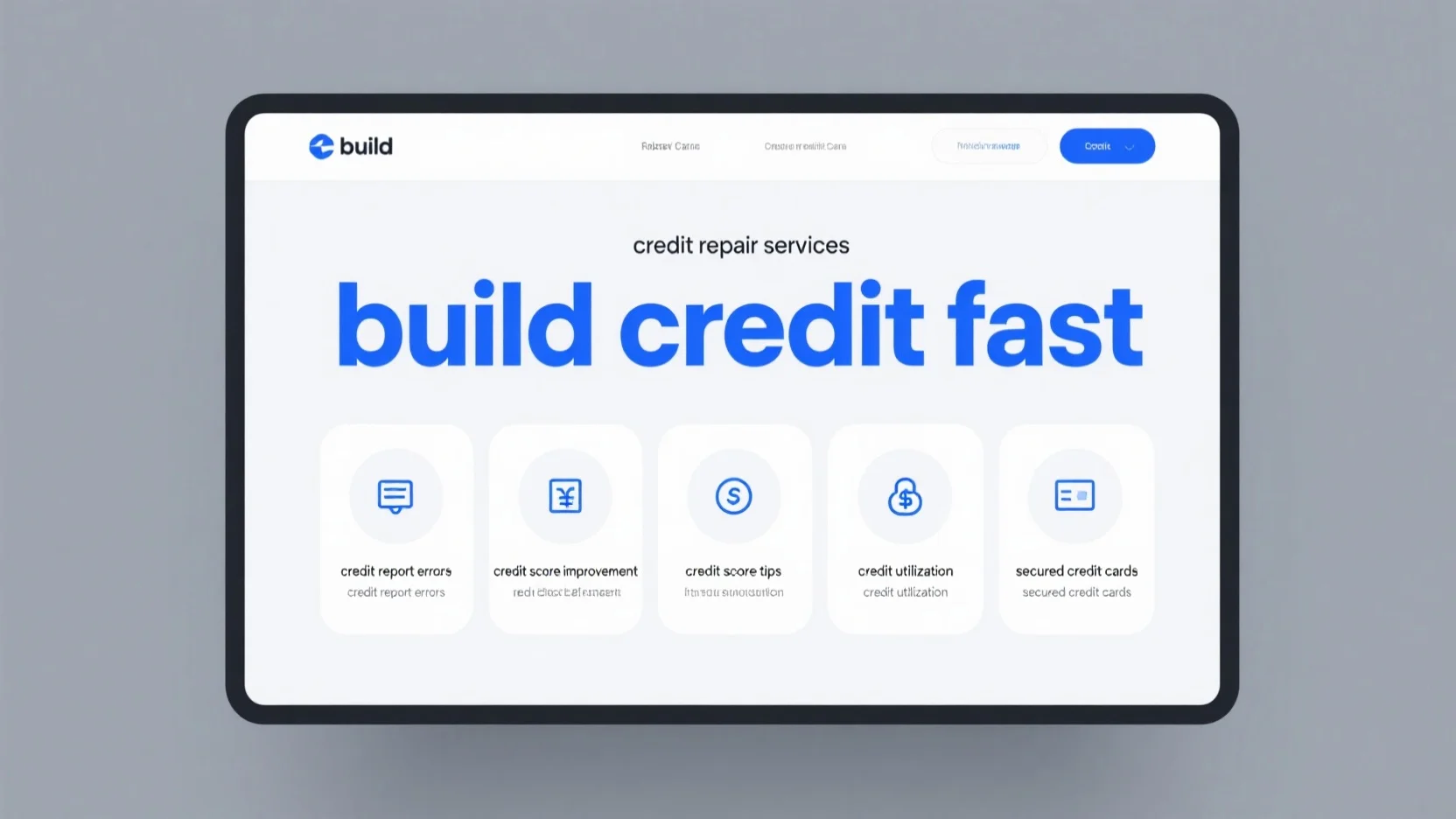
How to Build a Strong Credit Score for Better Financial Opportunities

Image Source: pexels
A good credit score helps you get better financial options, especially when considering how to improve credit score fast for loan approval. Lenders see people with high scores as safe borrowers, which often leads to lower interest rates and better loan deals. About half of Americans have credit scores ranging from 750 to 850, categorized as “very good” or “exceptional.” This illustrates how great credit can significantly assist you. If you want to raise your credit score quickly, focus on effective strategies and adopt smart money habits.
Key Takeaways
- Pay your bills on time. This is very important for keeping a good payment record, which helps your credit score a lot.
- Use less than 30% of your credit limit. Using less credit makes your score better and shows lenders you handle money wisely.
- Check your credit report often for mistakes. Fixing errors can raise your score fast and keep your financial chances safe.
Understanding Credit Scores
What Is a Credit Score?
A credit score shows how likely someone is to repay money. Lenders use it to decide if they can trust a borrower. In the U.S., two main scoring systems are used:
- FICO Score : This is the most common system, with scores from 300 to 850. It looks at things like paying bills on time, how much credit is used, and how long accounts have been open.
- VantageScore : Made by the three big credit bureaus, it also ranges from 300 to 850 but uses different rules than FICO.
These scores show how someone handles money and affect decisions about loans, credit cards, and other financial tools.
How Credit Scores Are Calculated
Credit scores depend on several important factors. Paying bills on time matters the most because it shows responsibility. Credit utilization, or how much credit you use compared to your limit, is also very important. Other things include how long you’ve had credit, the types of accounts you have, and recent credit checks.
For example, using less than 30% of your credit limit helps your score. Having older accounts and different types of credit, like credit cards and loans, also boosts your score. Knowing these details is key for anyone wanting to improve their score quickly.
Why Credit Scores Matter for Financial Opportunities
Your credit score affects your chances for better financial options. A high score means lower interest rates, better loans, and higher credit limits. A low score can mean higher costs or being denied credit.
For example, people with great scores often get the best mortgage rates, saving lots of money over time. Credit scores also decide if you qualify for top credit cards or personal loans. By raising their scores, people can get better deals and reach their financial goals.
How to Improve Credit Score Fast for Loan Approval
Always Pay Bills on Time
Paying bills on time helps improve credit scores fast. Payment history is a big part of your credit score. Even a small late payment can hurt your score for years. Use automatic payments or set reminders to avoid missing due dates. This keeps your payment history positive.
Use Less Than 30% of Your Credit Limit
Credit utilization means how much credit you use out of your limit. Experts say to keep this below 30%. Using closer to 1% is even better for your score. For example, if your card limit is $10,000, spend less than $3,000. Pay off balances often to keep your usage low.
Ask for a Higher Credit Limit
A higher credit limit can lower your credit usage. This helps your credit score. But asking for a limit increase might cause a small score drop at first.
- Hard inquiries can lower scores by up to five points.
- These stay on your credit report for two years.
Even with this short-term drop, a higher limit helps in the long run.
Pay Credit Card Bills More Often
Paying credit card bills more than once a month helps. It lowers your credit usage before it’s reported to credit bureaus. This keeps your reported balance low, even if you use your card a lot. It also shows lenders you handle money well.
Fix Mistakes on Your Credit Report
Errors on credit reports can hurt your score. Common mistakes include wrong account details or incorrect balances.
“Errors on your credit report can cause big problems… they might even stop you from getting a job or renting a home.”
Check your credit report often and fix any mistakes. Fixing errors can quickly boost your score.
Use a Secured Credit Card to Build Credit
Secured credit cards are great for building or fixing credit. Buy small things and pay them off on time to show good habits. For example, one person raised their score by 50 points by paying off a small subscription. Another switched to an unsecured card after one month of using a secured card. Avoid mistakes like not paying in full or letting interest build up.
Common Mistakes to Avoid When Improving Your Credit Score
Closing Old Credit Accounts
Closing old accounts might seem smart but can hurt scores. Older accounts help your credit history look longer, which is important. If you close an account, your average credit age gets shorter. This can lower your score, even if the account had no debt. Keeping old accounts open, especially good ones, helps your credit stay strong.
Applying for Too Many Credit Accounts at Once
Applying for many credit accounts quickly can hurt your score. Each application causes a hard inquiry, which lowers your score for a while.
- Hard inquiries show new debt, which may worry lenders.
- Many inquiries together can lower your score even more.
To avoid this, only apply for credit when you really need it.
Ignoring Your Credit Report
Not checking your credit report can cause missed chances to fix mistakes. Studies show many people find errors in their reports.
- About 44% of people find at least one mistake.
- Big errors, like wrong accounts or payments, affect 27% of people.
Checking your report often helps you fix problems and protect your score.
Carrying High Balances on Credit Cards
Having high credit card balances raises your credit usage, which hurts scores. People with great scores usually keep usage below 10%.
- The average American owed $7,236 on credit cards in late 2024, up from $7,130 earlier that year.
- Lower balances mean better usage rates, which help scores.
Paying off balances and keeping usage low improves your credit over time.
Long-Term Habits for Strong Credit Health
Check Your Credit Score Often
Checking your credit score helps you know your financial status. Regular checks can catch mistakes or strange activity that might hurt your credit. Many tools and apps make this easy and helpful:
- Aura : Monitors three credit bureaus and sends quick fraud alerts for $9.99/month.
- Credit Karma : Gives free daily credit updates and card suggestions.
- Credit Sesame : Offers TransUnion monitoring and free identity theft insurance.
- CreditWise by Capital One : Tracks two credit bureaus and sends free fraud alerts.
- myFICO : Provides FICO® scores and three-bureau monitoring starting at $19.95/month.
- IdentityForce : Shows daily VantageScore® 3.0 scores and quarterly reports for $34.90/month.
Using these tools helps you fix problems fast and keep good credit.
Use Different Types of Credit
Having different kinds of credit helps your credit score. Lenders like to see you can handle various types of credit. The table below shows two main types of credit accounts:
| Type of Credit Account | Examples |
|---|---|
| Revolving Credit | Credit cards, Store credit cards, Home equity lines of credit |
| Installment Credit | Home loans, Car loans, Personal loans, Student loans |
Managing these accounts well shows lenders you are responsible with money. It also helps you reach goals like improving your credit score quickly.
Build Good Money Habits
Good money habits are important for keeping a strong credit score. Examples include:
- Limiting how many credit accounts you open.
- Being careful when applying for new credit.
- Keeping older accounts active.
- Using less than your credit limit.
- Avoiding big problems like bankruptcies or foreclosures.
These habits improve your credit score and show lenders you can be trusted.
Keep Old Credit Accounts Open
Closing old credit accounts might seem smart, but it can hurt your score. Older accounts make your credit history longer, which is important for your score. Keep these accounts open, even if you don’t use them much. Check them regularly to make sure they stay in good standing.
A good credit score gives you better financial options. These include lower interest rates and higher credit limits. To improve, always pay bills on time and use less credit. Check your credit report often for mistakes. Building good habits helps keep your credit strong. Stay consistent and focused to reach your money goals.
FAQ
How can you quickly improve your credit score?
Pay your bills on time every month. Keep your credit usage under 30%. Fix any mistakes on your credit report. These actions can raise your score fast.
How often should you check your credit report?
Check your credit report at least once a year. This helps you find errors or fraud early and keeps your finances safe.
Does applying for many credit cards lower your score?
Yes, applying for several cards causes hard inquiries. These can drop your score for a short time. Only apply when you really need a new card.
Tip : Use free tools to watch your credit score and spot problems quickly.
